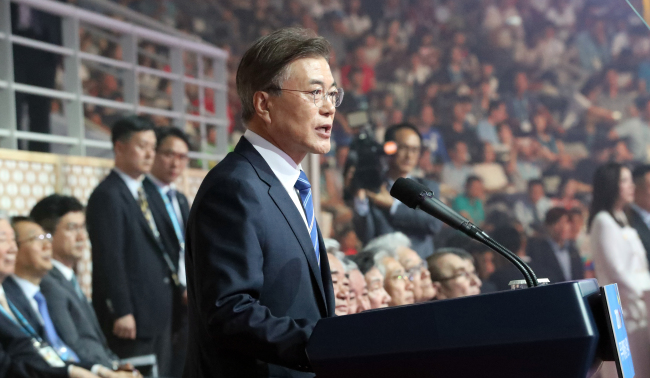Gloomy outlook for joint Olympics team, with NK IOC member’s skepticism
By Jung Min-kyungPublished : June 26, 2017 - 15:50
The outlook of Seoul’s suggestion to form an inter-Korean team for the 2018 PyeongChang Winter Olympics appears bleak, with the North’s International Olympic Committee member displaying skepticism toward the plan.
Chang Ung, the only North Korean member of the IOC and former International Taekwondo Federation chief, expressed his doubts toward Seoul’s Culture Minister Do Jong-hwan’s proposal of a joint women’s hockey team and holding skiing games on North Korean slopes.
Chang Ung, the only North Korean member of the IOC and former International Taekwondo Federation chief, expressed his doubts toward Seoul’s Culture Minister Do Jong-hwan’s proposal of a joint women’s hockey team and holding skiing games on North Korean slopes.

Chang is currently visiting South Korea for this year’s World Taekwondo Federation World Taekwondo Championships in Muju, North Jeolla Province, as head of the 32-member North Korean demonstration team.
“When we fielded a joint team at the 1991 World Table Tennis Championships, there were 22 rounds of inter-Korean talks and they took five months,” Chang was quoted as saying at a dinner reception after the opening ceremony, according to a WTF competition official. “That is the reality that we’re faced with.”
On co-hosting skiing competitions in North Korea’s Masikryong, Chang said, “As an Olympics expert, (I think) it’s a bit late.”
Masikryong is the only ski resort in North Korea. It was criticized by the international community as Kim Jong-un’s showpiece when it opened in 2014.
The largest world taekwondo competition to date kicked off Saturday with President Moon Jae-in’s congratulatory speech embodying his wishes to restore inter-Korean dialogue through cross-border cooperation for the upcoming winter games.
In a short interview with local daily DongA Ilbo on Saturday, Chang also disagreed with Moon’s comparing of the inter-Korean exchange plans to ping-pong diplomacy between US and China in the early 1970s.
“It’s inappropriate to bring the Olympics into political affairs,” Chang said.
“I disagree with the saying that ping-pong diplomacy made the global community. Issues surrounding the political environment should be solved first because politics is always above sports.”
Despite Chang’s series of comments that threw cold water on Seoul’s hopes for reviving ties with Pyongyang through sports, the Moon administration remains behind the idea of a joint Winter Olympics team.
“If the North accepts the president’s offer, there will be many tasks to be done at the working level. We are expecting the North to (positively) respond to Moon’s proposal,” Lee Duk-haeng, spokesman at Seoul’s Unification Ministry, said during a press briefing Monday.
Rep. An Min-seok of the ruling Democratic Party of Korea, who attended a luncheon meeting with Chang Ung in Muju on Saturday, also supported Seoul’s goals, but stressed time management as a crucial factor.
“The Olympics won’t wait for us,” An said.
“But the nature of sports talks is that once the leaderships of both Koreas make political decisions, the pace of things can really pick up and it could lead to great results.”
“It could be summer or autumn, but if we do hold a new round of sports talks, we could discuss the PyeongChang Winter Olympics within that framework.”
An expert in Seoul suggested taking a step back and viewing the administration’s approach as part of the bigger picture.
“Forming an inter-Korean sports team is a very complicated process technically,” said Lee Woo-young, a professor at the University of North Korean Studies in Seoul.
“It would be wise to see this as the Moon administration’s gesture to reinstate dialogue with North Korea rather than an actual plan to achieve solid cooperation for the upcoming Olympics.”
“The past cases of joint teams with table tennis and soccer was based on win-win strategies thoroughly crafted for both sides -- this time, there’s lack of time to achieve such goals.”
South Korea and North Korea fielded joint teams at the 1991 World Table Tennis Championships and the 1991 FIFA World Youth Championship. They also marched in together for the opening ceremonies of the 2000 Sydney Olympics and 2004 Athens Olympics under the same name, “Korea,” but competed separately for the games.
By Jung Min-kyung (mkjung@heraldcorp.com)



![[AtoZ into Korean mind] Humor in Korea: Navigating the line between what's funny and not](http://res.heraldm.com/phpwas/restmb_idxmake.php?idx=644&simg=/content/image/2024/04/22/20240422050642_0.jpg&u=)


![[Herald Interview] Why Toss invited hackers to penetrate its system](http://res.heraldm.com/phpwas/restmb_idxmake.php?idx=644&simg=/content/image/2024/04/22/20240422050569_0.jpg&u=20240422150649)
![[Graphic News] 77% of young Koreans still financially dependent](http://res.heraldm.com/phpwas/restmb_idxmake.php?idx=644&simg=/content/image/2024/04/22/20240422050762_0.gif&u=)

![[Exclusive] Korean military set to ban iPhones over 'security' concerns](http://res.heraldm.com/phpwas/restmb_idxmake.php?idx=644&simg=/content/image/2024/04/23/20240423050599_0.jpg&u=20240423171347)






![[Exclusive] Korean military to ban iPhones over security issues](http://res.heraldm.com/phpwas/restmb_idxmake.php?idx=652&simg=/content/image/2024/04/23/20240423050599_0.jpg&u=20240423171347)



![[Today’s K-pop] Ateez confirms US tour details](http://res.heraldm.com/phpwas/restmb_idxmake.php?idx=642&simg=/content/image/2024/04/23/20240423050700_0.jpg&u=)